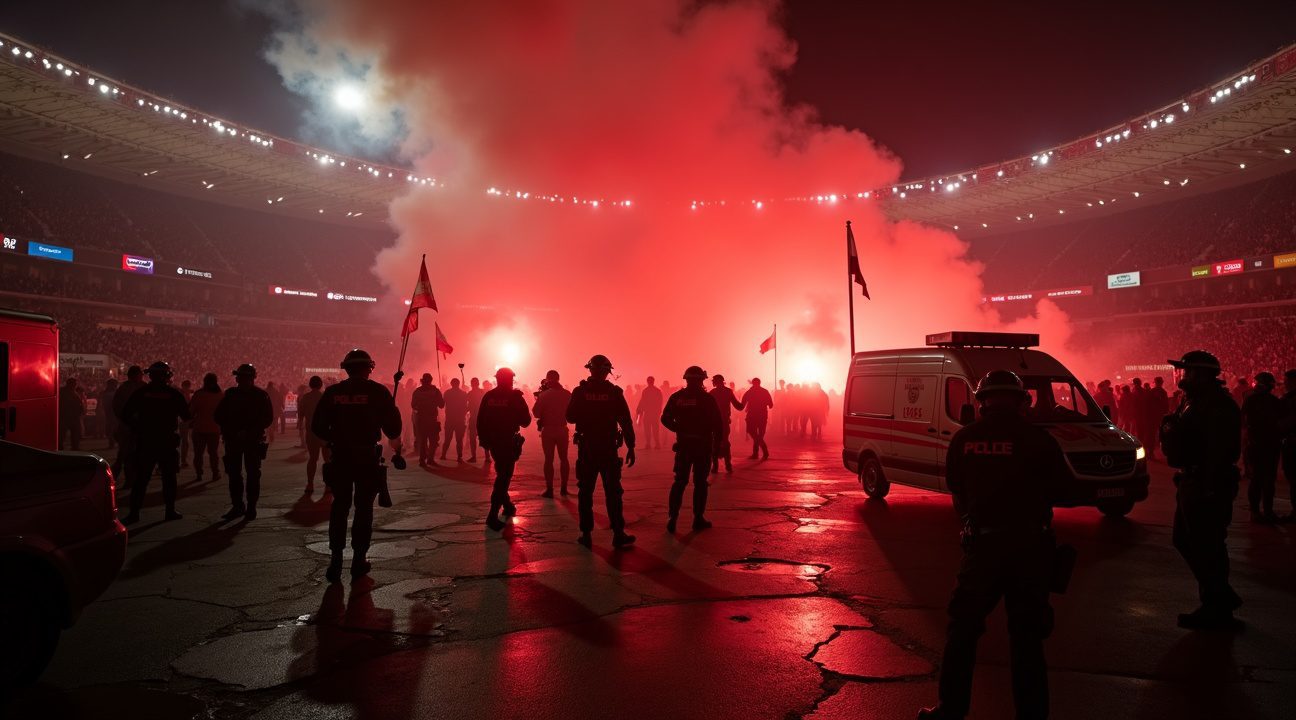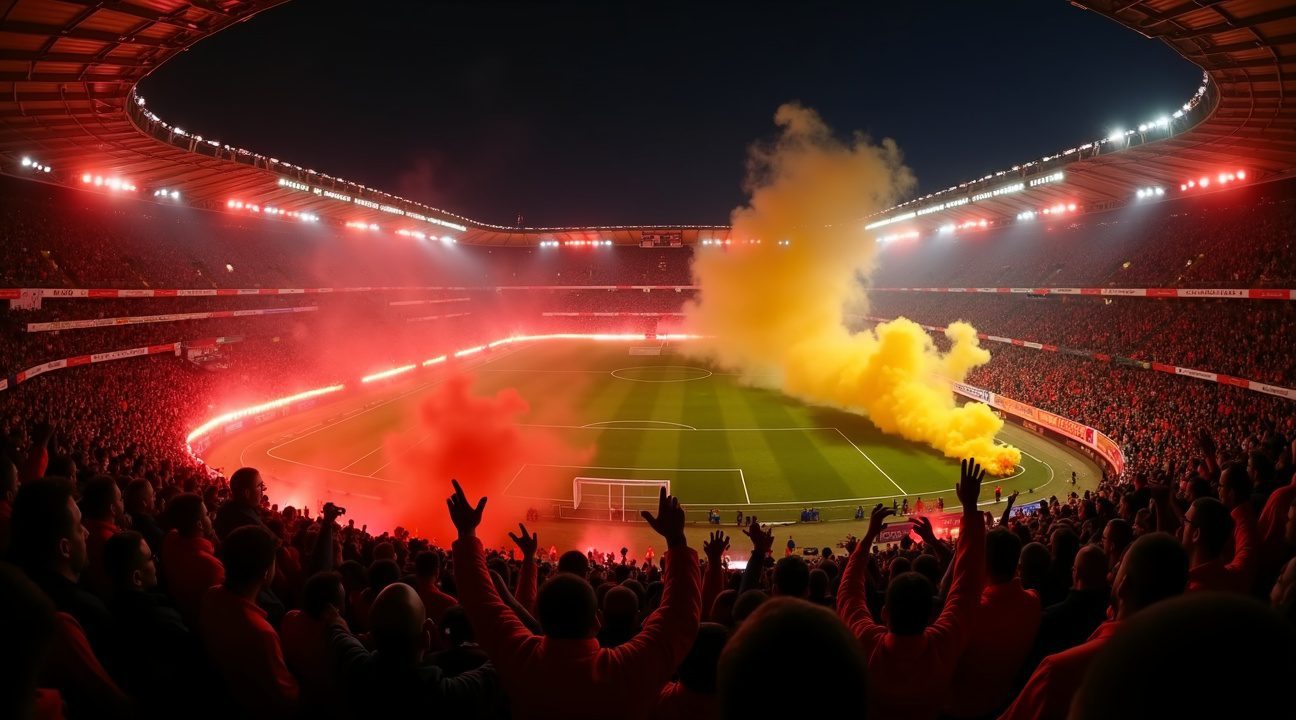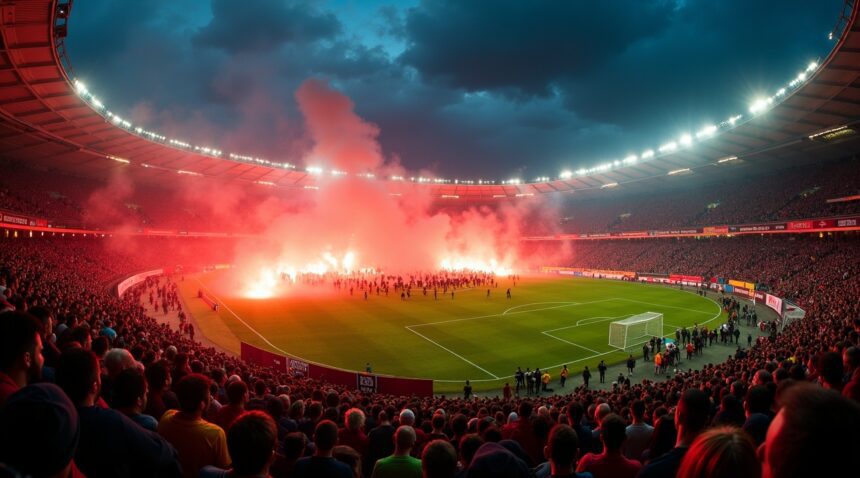Israeli police made the unprecedented decision to cancel the highly anticipated Tel Aviv derby between Hapoel Tel Aviv and Maccabi Tel Aviv after widespread rioting erupted both inside and outside Bloomfield Stadium on Sunday night.
Key Takeaways
- Police arrested nine individuals at the scene and brought in 16 additional people for questioning as part of their investigation into the stadium violence.
- Fans threw flares and projectiles directly onto the pitch while significant unrest erupted in areas surrounding the stadium, creating a broader public safety crisis.
- Several police officers sustained injuries while attempting to restore order during the chaotic confrontations throughout the evening.
- Maccabi Tel Aviv blamed Hapoel fans for initiating the violence, while Hapoel officials accused Maccabi supporters of being the instigators, resulting in a public relations battle between the rival clubs.
- The incident highlights growing concerns about fan violence in Israeli football and exposes critical gaps in current stadium security protocols for managing volatile crowd situations.
Nine Arrests Made as Flares and Projectiles Force Match Cancellation
Israeli police made the unprecedented decision to cancel the highly anticipated Tel Aviv derby after widespread rioting erupted both inside and outside the stadium. The violence reached dangerous levels that threatened human safety, forcing authorities to prioritize public protection over the continuation of the match.
Immediate Police Response and Arrests
Law enforcement officials detained nine individuals directly at the scene during the chaotic events. Authorities didn’t stop there — they brought in an additional 16 people for questioning as part of their comprehensive investigation into the violence. This swift response demonstrates how seriously police treated the escalating situation, though the sheer scale of unrest clearly overwhelmed initial crowd control measures.
Several police officers sustained injuries while attempting to restore order and protect public safety. The severity of these injuries highlights the intensity of the confrontations that unfolded throughout the evening.
Escalating Violence Inside and Outside the Stadium
Police footage captured the disturbing scenes that led to the match cancellation. Fans hurled projectiles and flares directly onto the pitch, creating hazardous conditions for players, officials, and other spectators. The violence wasn’t contained within the stadium walls — significant unrest erupted in surrounding areas, creating a broader public safety crisis.
The use of flares represents a particularly dangerous escalation in fan behavior. These pyrotechnic devices can cause serious burns and injuries when thrown at people, while also creating fire hazards in crowded venues. Combined with various projectiles being launched onto the playing field, the situation became untenable for continuing the match.
Derby matches traditionally generate intense emotions between rival supporters, but this incident crossed well beyond acceptable boundaries of competitive passion. The widespread nature of the violence, affecting multiple areas simultaneously, suggests a coordinated breakdown in crowd control that required immediate intervention.
This cancellation sends a strong message about the consequences of fan violence in professional sports. When spectator behavior threatens human life and safety, authorities won’t hesitate to halt proceedings regardless of the match’s significance or the disappointment it causes to law-abiding fans. The incident serves as a stark reminder that sporting passion must never escalate into dangerous criminal behavior that puts innocent people at risk.

Sunday Night Showdown at Bloomfield Stadium Turns Chaotic
The highly anticipated Tel Aviv derby between Hapoel Tel Aviv and Maccabi Tel Aviv was set to ignite Bloomfield Stadium on Sunday night. This fixture represented one of Israeli football’s most intense rivalries, drawing passionate supporters from across the city who eagerly awaited the clash between these historic clubs.
Bloomfield Stadium serves as the shared home venue for both teams, creating a unique dynamic where fierce rivals must coexist on the same pitch. For this particular match, Hapoel Tel Aviv held the official home advantage, though the distinction often becomes meaningless when both sets of supporters pack the stands with equal fervor.
The Significance of Tel Aviv’s Premier Football Rivalry
The Tel Aviv derby carries immense weight in Israeli football culture, transcending mere sporting competition to become a cultural phenomenon. Both Hapoel Tel Aviv and Maccabi Tel Aviv boast rich histories dating back decades, with each club representing different segments of the city’s diverse population. These matches typically generate electric atmospheres that showcase the passionate nature of Israeli football fans.
Stadium security preparations for such high-profile encounters require extensive planning, given the intensity of emotions these fixtures generate. The shared venue arrangement at Bloomfield Stadium adds another layer of complexity, as both clubs must coordinate their supporter arrangements while maintaining safety protocols. Local authorities typically deploy additional security measures for these derby matches, recognizing their potential for heightened tensions.
Pre-Match Atmosphere and Stadium Preparations
Sunday night fixtures often amplify the already charged atmosphere surrounding Tel Aviv derbies. The timing allows working supporters to attend while creating an extended period of pre-match buildup throughout the day. Bloomfield Stadium’s infrastructure accommodates approximately 29,000 spectators, though capacity restrictions and security considerations can reduce actual attendance figures.
Both clubs’ supporter groups traditionally organize elaborate displays and choreographed chants for these encounters. The rivalry extends beyond the pitch, with fans often engaging in friendly banter and competitive displays of loyalty throughout the city in the hours leading up to kickoff. Local businesses typically experience increased activity as supporters gather at nearby establishments before making their way to the stadium. What was supposed to be another chapter in this storied rivalry would instead become a cautionary tale about how quickly modern sports events can spiral out of control when crowd management fails.

Maccabi Tel Aviv Blames Hapoel Fans for Violence
Maccabi Tel Aviv officials quickly shifted blame away from their supporters following the cancellation, pointing fingers directly at their cross-town rivals. The club issued a statement claiming the match postponement resulted from flares and other projectiles thrown by Hapoel fans, creating dangerous conditions that forced police intervention.
Contrasting Club Statements Reveal Deep Divide
Both clubs released official statements that painted drastically different pictures of the events leading to the cancellation. Maccabi Tel Aviv’s statement emphasized their commitment to peaceful competition while characterizing Hapoel supporters as instigators who escalated tensions beyond acceptable limits. Their version of events focused heavily on the projectiles thrown from the Hapoel section, which they claimed endangered players and officials on the pitch.
Hapoel Tel Aviv responded with their own statement that challenged Maccabi’s narrative entirely. Their officials accused Maccabi supporters of initiating the violence and claimed their own fans were merely responding to provocations. This back-and-forth created a public relations battle that extended well beyond the stadium walls, with each club’s media departments working overtime to shape public perception of the incident.
The stark contrast between these official positions highlights how competitive dynamics can influence organizational responses to crisis situations. Neither club appeared willing to accept responsibility for their supporters’ actions, instead choosing to deflect blame onto their rivals.
Fan Responsibility and Rivalry Tensions
The dispute over fan responsibility reflects deeper issues within Tel Aviv’s football culture. Maccabi officials argued that their supporters’ passionate but controlled celebration contrasted sharply with what they described as Hapoel fans’ destructive behavior. They emphasized their club’s history of promoting positive fan engagement while suggesting their rivals had failed to properly educate their supporter base.
Several key factors contributed to the escalating blame game between the clubs:
- Historical grievances between supporter groups that extend beyond football
- Competition for city bragging rights that intensifies during derby matches
- Social and political divisions that often manifest in stadium confrontations
- Previous incidents that each side cites as evidence of the other’s poor fan control
- Media coverage that amplifies tensions between the rival camps
Maccabi’s leadership pointed to their recent investments in fan education programs as evidence of their commitment to reducing violence. They contrasted this with what they characterized as Hapoel’s failure to address known issues within their supporter ranks. Club president statements emphasized how they’d worked with police and security officials to identify potential troublemakers before the match.
However, Hapoel officials rejected these characterizations entirely. Their statements accused Maccabi of selective memory regarding previous incidents and suggested their rivals were using this situation to gain political advantage within Israeli football circles. They pointed to their own community outreach programs and questioned why major events often see similar patterns of blame-shifting rather than genuine accountability.
The rivalry between these clubs extends far beyond typical football competition. Political, cultural, and economic differences between their supporter bases create an environment where even minor incidents can escalate quickly. Both clubs acknowledged this reality while simultaneously claiming their rivals exploit these divisions for competitive advantage.
Police statements remained notably neutral compared to the club positions, focusing on safety concerns rather than assigning blame to specific supporter groups. Their approach suggests law enforcement recognizes that taking sides in these disputes often worsens rather than improves future security situations.
The finger-pointing between Maccabi and Hapoel demonstrates how organizational pride can prevent honest self-reflection after violent incidents. Instead of examining their own supporter cultures and security procedures, both clubs chose to focus primarily on their rivals’ failings. This pattern makes future violence more likely since neither organization feels compelled to address potential issues within their own ranks.
Growing Concerns About Fan Violence in Israeli Football
The cancellation of the Tel Aviv derby represents a significant escalation in fan violence that has plagued Israeli football for years. Stadium authorities and police face mounting pressure to develop comprehensive strategies that can effectively manage increasingly volatile crowd situations while preserving the passionate atmosphere that defines Israeli football culture.
Security Challenges and Policing Strategies
Israeli Premier League matches now require extensive security planning that goes far beyond standard crowd control measures. Police departments must coordinate with stadium officials weeks in advance, deploying specialized riot control units and implementing strict entry procedures. The Tel Aviv incident exposed critical gaps in current security protocols, particularly regarding early intervention techniques and crowd psychology management.
Stadium security systems in Israel have evolved considerably, incorporating advanced surveillance technology and trained security personnel. However, the intensity of local rivalries creates unique challenges that standard security measures often can’t address. The passionate fan culture that makes Israeli football so compelling also generates the conditions where minor incidents can rapidly escalate into full-scale riots.
Comparative Analysis and Broader Implications
Fan violence in Israeli football mirrors troubling patterns seen across European leagues, though with distinct characteristics shaped by local tensions and cultural factors. Similar incidents in countries like Turkey, Serbia, and Italy demonstrate how quickly football rivalries can spiral beyond sports into broader social conflicts.
The repercussions for clubs involved in such incidents typically include:
- Heavy fines
- Stadium closures
- Point deductions
These consequences serve as deterrents while highlighting the financial and competitive costs of failing to manage fan behavior effectively. Israeli football authorities must balance maintaining the sport’s passionate atmosphere with ensuring public safety.
Recent years have seen increasing collaboration between clubs, police, and fan groups to develop preventive measures. These initiatives focus on:
- Education
- Early intervention
- Creating positive outlets for fan energy
The success of such programs varies significantly, with some clubs making notable progress while others continue struggling with persistent violence.
The Tel Aviv derby cancellation underscores the urgent need for innovative approaches to sports safety. Traditional policing methods alone prove insufficient when dealing with deeply rooted rivalries and passionate fan bases. Effective solutions require understanding the complex social dynamics that drive fan behavior and developing targeted interventions that address root causes rather than merely responding to symptoms.
Moving forward, Israeli football must confront these challenges head-on, implementing comprehensive reforms that protect both participants and spectators while preserving the authentic passion that makes the sport so captivating. The stakes extend beyond individual matches, affecting the league’s reputation and the broader future of professional football in Israel.
Sources:
The Guardian – “Tel Aviv football derby between Hapoel and Maccabi called off after rioting”
YouTube


